
(1) Movsesian,Sergei (2699) — Cheparinov,Ivan (2678) [A29]
1.c4 Nf6 2.Nc3 e5 3.g3 d5 4.cxd5 Nxd5 5.Bg2 Nb6 6.Nf3 Nc6 7.0–0 Be7 8.d3 0–0 9.a3 Be6 10.Be3 f6 11.Rc1 Nd4 12.Bxd4 exd4 13.Ne4 c6 14.b4 Rf7 15.Nc5 Bxc5 16.bxc5 Nc8 17.Qa4 Rd7 18.Rb1 Ne7 19.Nd2 b5 20.Qb4 a5 21.Qb2 Qc7 22.Ne4 Rad8 23.Nd6 Nc8 24.Qxd4 Nxd6 25.cxd6 Rxd6 26.Qc3 Qb6 27.Rfc1 Rb8 28.Qc5 Qxc5 29.Rxc5 Bd7

White stands better in this endgame, as he has some pressure on the black queenside. 30.Kf1 Rb6 31.Rbc1 Kf7 32.Ke1 Ke7 33.Kd2 f5 [Black should avoid in general any more 'weaknesses'. 33...Kd8 34.e3 Kc7 35.d4 Rb8+/= should be preferable.] 34.e3 Rf6 35.d4 Kd6 36.Bf3 Rf8

37.d5!? [An interesting break, which allows more activity to the white rooks. 37.h4 Rfb8 38.e4 +/= was looking somewhat better.] 37…cxd5 38.Rxd5+ Ke6 39.Rd4 Rd6?! [Black should exchange the other rook: 39...Rc8! 40.Rxc8 Bxc8= .] 40.Rc7! Rc8 41.Ra7 And now the white rook is rather active on the 7th rank. 41…a4 42.Be2 Rc5 43.Bd3 g6 44.h4 Rc8?! [I feel that Black should have opted for the more active 44...Rcd5 45.Kc3 Rc5+ 46.Kb4 Rcd5 47.Rxd5 Rxd5 48.Kc3 Rc5+ 49.Kd2 Rd5 50.Rb7 (50.Ra6+ Rd6 51.Ra5 Rd5) 50...Bc6 51.Rb8 Kd6 52.h5 +/= .] 45.h5 Rb8 46.Kc3 Rxd4 47.exd4 gxh5 48.Kb4?! [The rook ending after 48.Bxf5+ Kxf5 49.Rxd7 Rf8 50.Re7 Kg6 51.Re6+ Kg7 52.d5 looks very promising.] 48…Kd6?! [Passivity never helps! With 48...f4! Black should manage to draw.] 49.Ra6+ Kd5 50.Rh6 Be6?

[Missing a good chance to save the half-point: 50...f4! 51.Rxh5+ Kxd4 52.Rxh7 Kxd3 53.Rxd7+ Ke2 54.gxf4 Rf8! . Now Black gets into a mating net!] 51.Bb1! Bg8? [Black didn't get it! He should have accepted his mistake and opt for 51...Bd7 52.Rxh7 Bc6 53.Rxh5± ] 52.Kc3! b4+ 53.axb4 a3 54.Kd3 And as the coming 55.Ba2+ decides, Black resigned. 1–0
(2) Potapov,Pavel (2460) — Rublevsky,Sergei (2695) [B22]
1.e4 c5 2.c3 Nf6 3.e5 Nd5 4.Nf3 e6 5.d4 cxd4 6.cxd4 d6 7.Bc4 Nb6 8.Bd3 Nc6 9.0–0 Nb4 10.Be4 [Playable is 10.Bg5 Be7 11.Bxe7 Qxe7 12.Nc3 Nxd3 13.Qxd3 0–0 14.Ne4 dxe5 15.dxe5 Bd7 16.Nd4 Nd5 17.Rad1+/= as in Godena,M-Mastrovasilis,D Porto Carras 2011.] 10…d5 11.Bd3 Nxd3 12.Qxd3 Be7 13.b3 0–0 14.a4 Bd7 15.Nc3 Rc8 16.Bd2
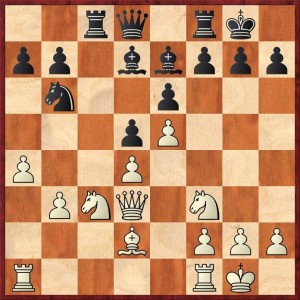
16…Na8!? [A novelty, planning to place the knight on b4 (...Na8-c7-a6-b4). Previously 16...Bc6 has been played: 17.Rfc1 h6 18.Ne2 Re8 19.Nf4 Bf8 20.h4 ½–½ Potapov,P-Isajevsky,A Moscow 2010.] 17.Ne2 White enjoys more space and he can try to create an initiative in both flanks. 17…Nc7 18.Ba5 Trying to provoke …b6, stopping the ….Na8-c7-a6-b4 redeployment. 18…Qe8 19.Rfc1 Na6 20.Nf4 Nb4? [A blunder. 20...Rxc1+ 21.Rxc1 Qb8 22.Nh5 Rc8 was plain equal.] 21.Bxb4 Bxb4 22.Ng5! Black’s kingside remained without any guard and the end is near. 22…g6 23.Qh3 h5 24.Nxh5! [24.Nxh5 Black resigned as mate cannot be avoided: 24...gxh5 25.Qxh5] 1–0
(3) Nepomniachtchi,Ian (2717) — Grischuk,Alexander (2779) [B07]
1.e4 d6 2.d4 Nf6 3.Nc3 g6 4.g3 Bg7 5.Bg2 0–0 6.Nge2 Nbd7 7.0–0 c5 8.h3 Rb8 9.dxc5 Nxc5 10.a4 b6 11.Re1 Bb7 12.Nf4 Nfd7 13.Bd2 Rc8 14.Qe2
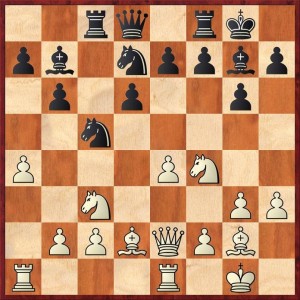
White played the opening without any concrete plan and without fantasy. Black got what he wanted — a lively middlegame with many pieces on the board. He now opted for a ‘Hedghog’ structure. 14…a6 15.Red1 e6 16.Be1?! [Too passive. White should have gone for a forced variation: 16.b4! Bxc3 (16...Nxa4!? 17.Nxa4 b5 18.Nc3 Bxc3 19.Bxc3 Rxc3 20.Rxd6 Qc8 21.Qd1÷) 17.Bxc3 Nxe4 (17...Nxa4 18.Be1) 18.Bxe4 Bxe4 19.Qxe4 Rxc3 20.Rxd6 Qc7 21.Rad1 Nf6 22.Qd4= .] 16…Qe7 17.Qe3 Ne5 18.b3 Rfd8 [18...f5!? was good for Black here.] 19.Rac1 h5! Trying to create more weaknesses on the white kingside — White is lacking any good plan… 20.Nfe2 Kh7 21.f4 Nc6 22.Na2 b5 23.axb5 axb5 24.Bc3
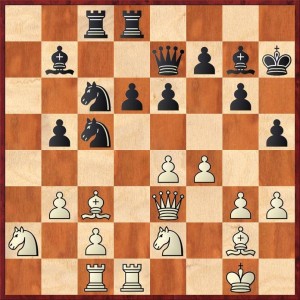
24…e5! 25.Re1 Ne6 26.Nb4 Nxb4 27.Bxb4 h4! White’s kingside is falling apart. 28.Rf1 hxg3 29.f5 What else? 29…Nf4? [Black mixes his ideas! He should have gone for the simple 29...Bh6 30.fxg6+ fxg6 31.Qxg3 Bxc1 was even better.] 30.Nxf4 Bh6 31.Qxg3 Bxf4 32.Rxf4! exf4 33.Qxf4 Qe5? [Black's last chance was laying on 33...Qf6 34.fxg6+ Qxg6 35.Qh4+ Kg7 36.c4 Re8³ .] 34.Qf2? [The obvious 34.Qh4+ Kg8 35.c4! Qd4+ 36.Kh1 Qg7 37.fxg6 fxg6 38.Bc3 Qh7 39.Qg4 was offering White very good compensation for the exchange - position should be unclear...] 34…Kg8? [Many mistakes in a row, but this is a rapid game - not much time to think! Black could have gained a good advantage with 34...gxf5! 35.c4 Qf6 36.Bc3 Qg6 .] 35.Re1? [35.c4! again was fine: 35...g5 36.Bc3 Qe7 (36...Qf4 37.Qxf4 gxf4 38.Bf6+/=) 37.f6 Qf8 38.Qb6 with unclear position.] 35…Re8 36.Qd2 d5 37.fxg6 fxg6 38.Rd1 dxe4 39.Qh6 Qh5! Now the queens are exchanged and Black shouldn’t have any problem to bring the bacon home. 40.Qxh5 gxh5 41.Bf1 Re5 42.Bd6 Rd8 43.Be2 Re6 44.Bb4 Rxd1+ 45.Bxd1 Re5 46.Kf2 e3+ 47.Ke2 Bc8 48.Bd6 Rd5 49.Bf4 Bxh3 50.Ke1 Bg4! 51.Bxg4 hxg4 52.c4 bxc4 53.bxc4 Rf5 [53...Rc5 54.Bxe3 Rxc4 was winning as well.] 54.Bxe3 g3 55.c5 Kf7 56.Ke2 Ke6 57.Bd4 Kd5 58.Bg1 Rf8 59.Be3 g2 60.Bf2 Rf7! Losing a tempo, forcing the white king to e1. 61.Ke1 [61.Ke3 Kxc5 62.Ke2+ Kd5 63.Ke3 Rf5 64.Ke2 Ke4–+ .] 61…Re7+! 62.Kd2 Rh7 [62...Rh7 White resigned, as 63.Ke2 Rh1 wins the bishop.] 0–1
(4) Andreikin,Dmitry (2713) — Bologan,Viktor (2672) [B40]
1.e4 c5 2.Nf3 e6 3.g3 d5 4.exd5 exd5 5.d4 Nc6 6.Bg2 Bg4 7.0–0 cxd4 8.h3 [An alternative is 8.Nbd2 Nf6 9.h3 Bf5 10.Nb3 Be7 11.Nfxd4 Be4 with unclear position Short,N-Vitiugov,N Caleta 2013.] 8…Bh5 9.g4 Bg6 10.Nxd4 Nf6 11.c4
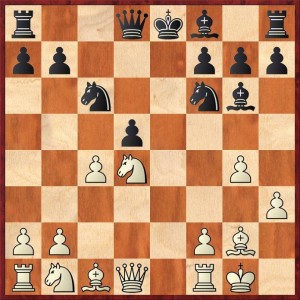
11…Be7 [A novelty. Previously 11...Be4 12.Bxe4 (12.Nc3!? Bxg2 13.Kxg2 dxc4 14.Nxc6 Qxd1 15.Rxd1 bxc6 16.Rd4 +/=) 12...Nxe4 13.cxd5 Qxd5 14.Nxc6 Qxd1 15.Rxd1 bxc6 16.Be3 Bc5 17.Nd2 Bxe3 18.Nxe4 Bf4 19.Nd6+ Kf8 20.Nc4 h5 21.Rd4 ½–½ Schmitz,J-Racherbaeumer,M Germany 2010, has been played.; Maybe 11...Bc5 is a bit better: 12.Nxc6 bxc6 13.cxd5 cxd5 14.Qa4+ Kf8 15.Nc3² .] 12.g5 Ne4 13.cxd5 Nxd4? [13...Qxd5 was forced: 14.Nxc6 Qxd1 (14...Qxc6 15.Nc3 0–0 16.Qe1 Bb4 17.Bxe4 Bxc3 18.Bxc6 Bxe1 19.Bxb7 Rab8 20.Bg2 Ba5 21.b3 +/=) 15.Rxd1 bxc6 16.Nc3 Nxc3 17.Bxc6+ Kf8 18.bxc3 Rc8 19.Bg2 +/= .] 14.Qxd4 Qb6? [A blunder. Black was forced to go for 14...Bxg5 15.Bxg5 Qxg5 16.h4 Qh5 17.Qa4+ Kf8 18.Nc3 Nxc3 19.bxc3± .] 15.Qa4+ [15.Qa4+ And Black resigned due to 15...Kf8 16.Bxe4 .] 1–0
(5) Mamedyarov,Shakhriyar (2753) — Inarkiev,Ernesto (2680) [D31]
1.d4 d5 2.c4 e6 3.Nc3 a6 4.cxd5 exd5 5.Bf4 Nf6 6.e3 Bd6 7.Qf3 [Another option is 7.Bg3 0–0 8.Bd3 Bg4 9.Nge2 Re8 10.Rc1 Bxe2 11.Nxe2 c6 12.Qb3 Qa5+ 13.Nc3 +/= Volkov,S-Ivanisevic,I Legnica 2013.] 7…c5!? [A novelty. 7...Be6 8.Bd3 c5 9.Bxd6 Qxd6 10.dxc5 Qxc5 11.Qf4 Nc6 12.Nge2 Rd8 13.Rd1 0–0 14.0–0 +/= was seen in Shomoev,A-Inarkiev,E Vladivostok 2012. Inarkiev decided to play ...c5 directly.] 8.dxc5 Bxc5 9.Bg5 Nbd7 10.0–0–0 A risky continuation, but White needed to complicate matters… 10…Qa5?! [10...Be7!? 11.Nge2 Nb6 12.h3 0–0 was interesting and preferable!] 11.Nge2?! [White could win the central pawn: 11.Nxd5! Nxd5 12.Qxd5 0–0 13.Be7 Re8 14.Bd6 +/= .] 11…0–0 12.Nd4 Bb4 13.Nb3 Qc7 14.Qf4?! [14.Bf4 Qc6 15.Nd4 Qc5 16.Nb3 was equal, but as said, White had to win at any cost!] 14…Qxf4? [The worst contiuation. The obvious 14...Bd6! was 'screaming' for! A sample continuation could be 15.Qh4 Ne4 (15...Be5 16.Bf4 (16.Kb1 Bxc3 17.Rc1 Ne4 18.Bd3 Nxg5 19.Qxg5 h6 20.Qe7 Qe5 21.Qa3 Bxb2 22.Qxb2 Qd6µ) 16...Bxf4 17.Qxf4 Qxf4 18.exf4 Nb6 19.f3=) 16.Bd3 Ba3! 17.Kb1 Nxc3+ 18.bxc3 h6 19.Be7 Bxe7 20.Qxe7 Qxc3µ .] 15.Bxf4 Bxc3 16.bxc3 Ne4 17.Rxd5 Nxf2 18.Rg1 Nf6 19.Rd4
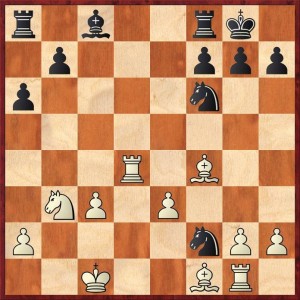
White enjoys the advantageof the bishop-pair and Black of the better pawn-structure. The position is balanced but a bit more easy for White in the coming middlegame/endgame. I think that this is the kind of position that White wanted to have in this critical game. 19…Bd7 20.Be2 Rac8 21.Kb2 Rfe8 22.h3 h6 23.Rf1 N2e4 24.c4 Ng5? [Black blunders in no time! He should have gone for 24...b6 with a balanced position.] 25.Bxg5 hxg5 26.Rxf6! gxf6 27.Rxd7 Rxe3 28.Bh5! Black is plain lost. White’s advantage of the two light pieces vs rook is not of a match. 28…b5 29.c5 [29.cxb5 axb5 30.Nd4 was another winning continuation.] 29…a5 30.Bxf7+ Kf8
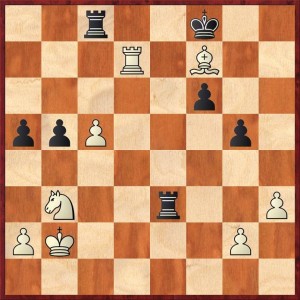
31.Bg6? [White makes his life difficult. The simple 31.Bd5 a4 32.Bb7 Rce8 33.Nd4 a3+ 34.Kc2 was curtains.] 31…a4? [But Black played instantly the text move. He should have tried 31...Re2+ 32.Bc2 Rxg2 33.Ra7± , when White still would have to work hard...] 32.Nd4 Rxc5 [Or 32...a3+ 33.Kc2 Rxc5+ 34.Kd2 Ree5 35.Bf7! Re7 36.Ne6++- .] 33.Rd8+ Kg7 34.Nf5+ Kxg6 [34...Rxf5 35.Bxf5 Re2+ 36.Ka3 Rxg2 37.Rd7+ Kf8 38.Rb7+- .] 35.Nxe3 And now White with an extra piece has no problem to cash the point. 35…b4 36.Rd3 Re5 37.g4 Re4 38.Nc2 Re2 39.Kc1 f5 40.Rd6+ Kf7 41.gxf5 b3 42.axb3 axb3 43.Nd4 Re3 44.Nc6 Kf8 45.f6 Kf7 46.Nd8+ Kf8 47.f7 Rf3 48.Re6 And Black resigned, making Mamedyarov the new FIDE Rapid World Champion! 1–0
